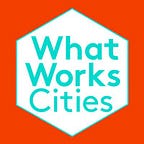Lessons from Newark, NJ: Utilizing reminder letters to increase affordable housing
Learn how the City of Newark boosted the number of registered units by nearly 2,000 — and how to do the same in your city
The Behavioral Insights (BIT) team recently partnered with What Works Cities to launch a new suite of resources for cities: The Replication Guides for City-Led Evaluations. These off-the-shelf, step-by-step project guides are designed to be used by cities to learn from and build on the successes of fellow cities, and to effectively tackle similar challenges in their own community.
Each resource is broken up into three sections — the challenge, the solution, and the evaluation — to take readers on a deep dive into the work the city conducted with BIT to solve a specific pressing challenge. This first case study in the replication guide features the work that Newark, NJ did in collaboration with BIT as a part of its involvement in the WWC Economic Mobility initiative, and then shares how Racine took Newark’s learnings and tested them in its own city.
Learn more about the evaluation that Newark ran with BIT and how you can have similar results in your city!
Case Study: Provide More Affordable Housing by Increasing Landlord Unit Registration
Project Summary
City: Newark, NJ (Note: this project was designed and implemented with direct support from the Behavioral Insights Team as part of the city’s participation in the WWC Economic Mobility Initiative)
Goal: Increase number of affordable units registered by landlords
Department Lead: Newark’s Economic & Housing Development
Timeline: 3–6 Months
Intervention: Letter
Evaluation Method: Randomized Control Trial
Result: Landlords receiving the letter were 20 times more likely to register their units, compared to a control group.
Want to try this yourself?
Read an overview of the project here and then download the evaluation replication worksheet here.
Sharing Lessons Across Cities
Not only did Newark get results, but as a direct result of the city’s work in the Economic Mobility initiative, ideas were shared between Newark and the City of Racine, WI. Continue reading to get a snapshot of how Racine built off Newark’s project with BIT.
Launched by Bloomberg Philanthropies in April 2015, What Works Cities (WWC) is one of the largest-ever philanthropic efforts to enhance cities’ use of data and evidence. Cities across the country are more effectively driving change and delivering results for residents by participating in our What Works Cities Certification program, the standard of excellence for data-driven local government. The program’s 45 criteria outline the people, processes, and policies foundational to a well-managed city.
Want to learn more about What Works Cities? Contact certification@whatworkscities.org.
The Behavioral Insights Team (BIT) is a social purpose organization that helps governments around the world boost their impact through the application of behavioral science and rigorous evaluation techniques. As part of What Works Cities, BIT helps cities develop and rigorously evaluate ideas for improving government services. We define rigorous evaluations as evaluations that utilize experimental or quasi-experimental methods. We believe this is the best way to help understand the impact of a program or policy.
Want to learn more about the Behavioral Insights Team and services available to cities? Contact info@bi.team
